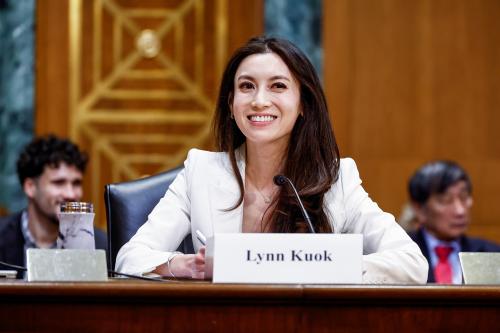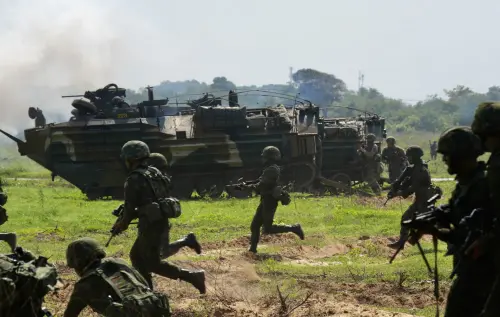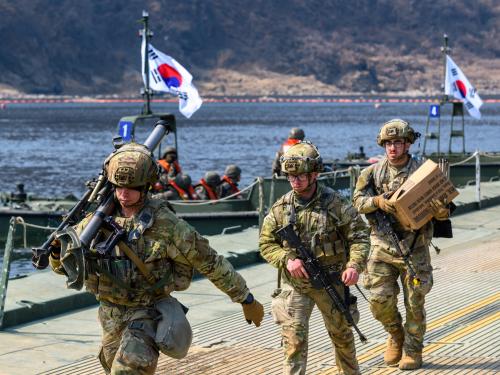Mongolia has emerged in less than two decades as a vibrant, if not complicated, democracy, and stands worthy of enhanced United States and international attention, investment, and support. With its rich cultural and historical legacies, small population, large land mass, and abundant natural resources, Mongolia last year achieved an 8.6 percent annual growth rate. And though it faces a widening gap between a small, wealthy elite and poor masses, it has privatized four-fifths of its economy from a Stalinist-era legacy, and in that regard stands as a model to North Korea to the east and the autocratic Stans to the west. Finally, Mongolia is wedged strategically between a resurgent Russia and a rising China, and from a wider perspective it borders a burgeoning Northeast Asia, a global economic powerhouse, and an economically expanding and – in the post 9-11 era – strategically viable, if not vital, Central Asia.
In its own right, Mongolia offers the international community a view of how a successful young democracy might appear – critical, as the tragic events in Myanmar/Burma remind us. Relative to many other nations, Mongolia has progressed remarkably well. Yet, its fragility in consolidation, highlighted by a weak judiciary, accusations of corruption, and need for public service and media professionalizaton, reminds us of the responsibility of the United States and international community to better assist Mongolia and advance it on a path it deserves high praise for pursuing. Mongolia also is an outstanding global citizen. It led the newly emerging and restored democracies effort early in the decade, hosted United Nations efforts aimed at better addressing human security, advanced itself as a nuclear weapons-free zone, supported international peacekeeping efforts and sited a major regional peacekeeping initiative, and – most recently – has offered itself as a site for dialogue on easing tensions on the Korean peninsula, notable given its good relations with both North and South Korea.
Mongolia’s President N. Enkhbayar this month visits the United States, receiving recognition for peacekeeping support in Iraq and Afghanistan and finally realizing the U.S.-delayed compact on the Millennium Challenge Account. This agreement represents the Bush administration’s recognition of Mongolia, the only Asian continental recipient, for its political and economic progress. The Mongolian president also hopes to garner support and insight on issues of global warming – acutely felt in this stunningly beautiful nation as rivers run dry, forest fires consume huge swaths, and desertification ravages the expanse. One need only drive over Peace Bridge in central Ulaanbaatar and see the dry riverbed beneath to be reminded of global warming’s devastating impact. The Mongolian President’s plans to visit Alaska and Wyoming are intended to increase support for ecological preservation and gain insights on clean-burning coal technology and more viable extractive industries. Stops in Washington and Chicago are designed to enhance investment, other economic support – notably a free trade agreement – and political accords. In an address at New York’s Columbia University about his nation’s democratic progress, international commitments, and efforts as a nuclear weapons-free zone, President Enkhbayar will provide us with a remarkable counterpoint to the Iranian president’s controversial September appearance. That nuclear weapons-free zone status is significant in impeding the transport of fissile materials across Mongolia, this with nuclear powers to the north and south, and as an exemplar for the Korean peninsula, which signed a basic agreement and denuclearization accord in 1991 and 1992, tenets of which will define any progress forward as the U.S. seeks DPRK denuclearization. The United States and international community should applaud the appearance of the Mongolian president, step away from a complacent and reactive nature that rewards proliferators rather than the small democratic stalwarts like Mongolia, and invest in the further democratic consolidation of Mongolia.
Mongolia’s Democratic Progress and Challenges
Mongolia has seen several national elections since transition from seventy years of Soviet Union dominance in 1990. Except for four years of Democratic Party control after the 1996 election and a fragile Democratic Party-led coalition government that took power in 2004, power has remained largely in the hands of the formerly communist Mongolian People’s Revolutionary Party (MPRP), which has refashioned itself as a modern new democratic party. However, on both sides of the aisle, accusations of corruption abound. Several members of parliament have been accused of influence peddling, and concern is compounded by parliamentary refusal to permit a proper judicial inquiry. For the United States and the international community, the controversy shines a spotlight on the need to support judicial reform and the effective emergence of a system of checks and balances – non-existent at the moment. The international community also has been slow to realize the fractures within both major parties and to play toward the reformers in each and in the third party. Accordingly, personality politics on both sides of the aisle has carried the day and is a dangerous threat to the development of fair, creditable, and accountable institutions. Those personality politics could see the disintegration of the MPRP into offshoots and a re-structuring of the Democratic Party.
Though blame is offered across the board and finger-pointing is pervasive, it serves the outside observer well to be cautious when assessing accusations of corruption – often made for political purposes – and also to consider the role of the so-called shock therapy measures that were introduced by the international community a decade ago. Those measures resulted in rapid privatization accompanied by a lack of transparency in sell-offs and land reform, weak institutions, and the emergence of a foundation for a system whereby a small elite controls disproportionate resources and a large population of poor are without basic services. The social implications of the growing rich-poor gap are enormous and warrant continued close observation.
Yet for all the fears of democratic rollback elsewhere among post-socialist systems, Mongolians have embraced choice; an active, vocal, and sensible civil society has emerged, and living standards appear better. Furthermore, Ulaanbaatar is not only a city of horsemen riding the crest of globalization, but a city of cranes – as in those of the construction variety, as Chinese, Korean, Japanese, and Russian moneys filter forth.
Economic Growth: The Horsemen’s Leap
With annual growth exceeding eight percent and a heady brew of new small business and innovative entrepreneurs, Mongolia feels like a happening place. Whereas at the turn of the decade Internet cafes numbered perhaps a dozen, Ulaanbaatar is now home to hundreds, symbolizing the enhanced interconnectivity of average Mongolians in the regional and global economies and the development of a sustainable information society. City cable boasts connectivity to multiple channels in some dozen countries. One rating agency recently elevated Mongolia to heightened levels, and banks and businesses are reporting growing returns. With a young, literate and polyglot population, Mongolia sometimes feels less like a Northeast Asian outpost and more like a globalized city in a southern or a northern European trading nation like the Netherlands or Belgium. Senior Korean colleagues suggest it reminds them of a rapidly growing Korea of a generation ago.
For all its economic pluses, perhaps mindful of banking scandals and persistent concerns about remaining state-held industries, but largely complacent, Americans have been less than steady investors. Mongolians clearly expect heightened U.S. investment, and leaders of the North America-Mongolia Business Council and Mongolia Society have striven to inform investors about the viable workforce, mining, and other opportunities associated with Mongolia. Russia, China, the European Union, Japan, and Korea have figured as major investors in Mongolia, at the expense of the U.S. in the view of some observers. Mongolia hopes that a Free Trade Agreement and possible Open Skies Agreement – which could someday realize direct flights between the two nations – might open necessary doors to stimulate the Mongolian-U.S. economic relationship.
Of particular concern for development specialists is the rapid urbanization effect in Mongolia. Although there are benefits associated with the availability of labor, the rush from the countryside to the capital and smaller urban centers has led to a stark transformation for the once-majority pastoral society. There is now a boom in urban sprawl, and utilities, services, and public health are largely non-existent. Poverty alleviation need be at the top of any list of tasks for Mongolia’s public figures, and those in the international community intent on seeing Mongolia succeed.
On the investment front, vulnerability is increasingly associated with the rush of foreign moneys, especially from Russia and China, bent on new opportunities in Tavan Tolgoi and Oyu Tolgoi. Both nations have spent the past year jockeying to secure preferential controls in vital extractive industries and within joint ventures. Mongolia struggles with these trade-offs, and to this end the United States and its foreign business community could do well by assisting Mongolia in its strategic diversification.
Mongolia’s Expanding Regional and Global Role
Through its third neighbor policy – one bent on expanding relations beyond Russia and China – Mongolia has emerged as an increasingly active regional and international contributor. For the Bush administration, that has been crystallized by Mongolia’s continued peacekeeping efforts in Iraq and Afghanistan, the hosting of Mongolia’s Khan Quest peacekeeping exercises, provision of over-flight rights in the immediate aftermath of 9-11, and other efforts at military-to-military cooperation. Mongolians appeared disappointed when the late 2005 visits by U.S. President George Bush and the then-U.S. Defense Secretary failed to see quick disbursement of the Millennium Challenge funds. That delay appears to have been overcome with the adept facilitation of U.S. Ambassador Mark Minton, and this month’s visit should enable the Mongolian President to return home with a firm commitment in hand. What U.S. administration officials have been less aware of is the significant risk associated with continued rotations of Mongolian troops in Iraq; loss of life would result in serious political debate at home. And Mongolians are uncertain at the level and depth of the U.S. commitment, especially when weighed against the tremendous pressures from Russia and China on Ulaanbaatar.
Mongolia’s relations with Russia have improved steadily this decade, though debates over the encroachment of Russian soft power, Russian demands over resources and property, and Soviet-era debt have not left the relationship without challenges. China too has been a heady investor in Mongolia, and at times has muscled its northern neighbor – for instance, by closing the border for several days after the visit by His Holiness the Dalai Lama, titular head of Mongolian Buddhism. But in general China has upgraded its relationship, largely over interest in the rich copper reserves along Mongolia’s southern border.
Mongolia has diversified its relations with a steady stream of contacts, including the European Union, Japan (Mongolia’s largest aid provider by far), South Korea, and Taiwan, with which it opened a trade office in 2002. Of greatest intrigue for the nations of Northeast Asia has been Mongolia’s adept handling of relations with North Korea. Mongolia welcomed North Korea’s number two official in summer 2007, building upon airlifts of food aid to North Korea, a visit by the DPRK deputy foreign minister, and reiteration of a friendship treaty earlier in the decade; the North Koreans proclaimed the Mongolians their “only true friends” in Northeast Asia during a 2002 visit. Mongolia has absorbed a tremendous number of North Korean refugees, some 5000 who transited to South Korea by one estimate; but new measures by Seoul to limit onward passage present a dilemma for Ulaanbaatar. There have been suggestions of South Korean interest in seeing North Korean labor assist with agricultural development schemes, tunneling and small business in Mongolia with the hope of returning such “models” to a more integrated or united peninsula. To that end, one senior Mongolian advisor speaks of the Mongolian story as a “low frequency” broadcast from Mongolia to North Korea, setting an example for transitioning from a Stalinist economy and even for political opening. Mongolia’s bent on nuclear weapons free zone status is another exemplar, and Ulaanbaatar sees itself as a possible seat for Northeast Asia regional discussions on inter-Korean or common development issues. It recently hosted Japan-North Korea working group discussions as part of the Six-Party Talks process. Mongolia’s lack of historical memory issues that persist among other Northeast Asian players make it an ideal setting for such endeavors, and its understanding of the common development and environmental challenges facing itself, rural China, the Russian Far East, and North Korea make for a sensible expansion of the Six-Party Talks beyond denuclearization efforts. Alongside nations like Australia, New Zealand, and Canada, Mongolia can figure as an important facilitator in agricultural, energy, environmental, energy, trade, ecotourism, and other dialogue.
Welcoming Mongolia’s President to Washington this month with a frank but positive assessment of common needs and an enhanced understanding of developments in Mongolia is critical. We need to better recognize this horseman of the north – which has listened to international requests, abided with its responsibilities, supported U.S. and international efforts, and grown itself as one of the region’s most vibrant locales – as a fitting response to forces of despotism, nuclear proliferation, and hostility that have challenged the international arena of late.
Dr. Stephen Noerper is a senior Asian analyst. He is a senior associate of the Nautilus Institute for Security and Sustainable Development, has taught and published widely, and was awarded the Mongolian State Friendship Medal in 2007. Contact [email protected]
The Brookings Institution is committed to quality, independence, and impact.
We are supported by a diverse array of funders. In line with our values and policies, each Brookings publication represents the sole views of its author(s).



Commentary
Op-edMongolia Matters
October 8, 2007